- Home
- Vince Flynn
Separation of Power Page 9
Separation of Power Read online
Page 9
"I know of someone who is quite remarkable at digging things up." Clark stared his fellow politician in the eye. "Things that people don't want dug up. I will articulate that you'd like to have a talk with him."
"Is he expensive?"
Clark moaned inside. Rudin was the cheapest bastard he'd ever met. In truth the man was expensive, but Clark was willing to subsidize the job. "He's actually quite reasonable." With a grin Clark added, "Or so I've been told."
"When can I meet with him?"
"I'll see if he can stop by your office this afternoon, but I can't make any promises. He's a very busy man."
"The sooner the better. I don't have a lot of time to derail this train."
Clark nodded. "And one more thing, Albert. Keep me out of this. All I'm doing is giving you someone's name. What you do from this point forward is up to you."
"Don't worry. Hank. I'll never forget that you were there for me during my darkest hours."
With a soft smile, Clark said, "Don't mention it. That's what friends are for." Clark kept the smile on his face, but inside he was elated. Rudin was about to be spoon-fed just enough information to bring about the end of Irene Kennedy's bid for the directorship of the CIA. The Democratic Party was about to be blindsided.
CHAPTER NINE.
Tel Aviv, Wednesday morning The sleek, black Mercedes sedan moved quickly through the streets of Tel Aviv. The sedan had tinted bulletproof windows, anti-mine flooring and armor-plated sides and roof. Ben Freidman sat in the backseat by himself. Two Mossad bodyguards were in front, one driving, the other riding shotgun. A small arsenal of weapons was stashed throughout the vehicle in case of an attack, which was a very real threat. So real that Freidman had two armor-plated cars, the Mercedes and a Peugeot. Freidman was switched from one car to the other throughout the day, always in an underground garage or a secluded area away from prying eyes.
Colonel Ben Freidman, the director general of Mossad, was perhaps the most hated man in the Middle East. Yes characters like Saddam Hussein and Yasser Arafat had their enemies, but they were Arabs, and make no mistake about it, the Middle East was overwhelmingly Arab. The multitude of factions and tribes that made up the Arab people had fought each other for millennia. The feuds ran deep, rich in historical lore. Despite the tiniest of differences from one group to the next they rarely got along. There was, however, one exception, and that exception was an almost universal hatred of Israel.
Amongst Arabs, the most hated and feared organization in all of Israel was Mossad. They were a den of assassins and thieves given official sanction by the government of Israel to conduct an illegal war against the Muslim peoples of the world.
This reputation did not bother Ben Freidman. In fact, he did everything in his power to perpetuate the fear. If one of the fallouts was that he had to lead a life in which he was constantly surrounded by bulletproof composites and heavily armed men, then so be it. The Arabs had sworn to crush the Israeli state and he had promised to defend it. They were in a war and had been for over fifty years. This sham of Middle East peace perpetuated by American do-gooders and soft Israeli politicians had made his job more difficult, but Freidman was not one to complain. He was always adapting, always preparing for the next battle.
For the first forty years of Mossad's existence the agency had been cloaked in secrecy, so much so that the various directors general were unknown to all but the prime minister and his or her cabinet. Times had changed though, and in the nineties Mossad became a victim of Israel 's increasingly partisan and volatile politics. The agency's anonymity was stripped away and the office of the director general became one of the hottest seats in the government. Ben Freidman's name was regularly printed in the papers and his picture was shown frequently on television. Any terrorist with half a brain could pick him out of a crowd and blow his head off.
The purges that Mossad underwent in the nineties had taught Freidman to be leery of all politicians. His allegiance was to his country and Mossad. The prime minister, and the rest of the squabbling politicians, could take a backseat. They had nearly destroyed the most effective spy agency in the world with their incessant desire to meddle. From 1951 to 1990, only six different directors general ran Mossad, but during the political bloodletting of the nineties four men had held the post. The lack of any sustained leadership had disastrous effects on recruiting and the morale of Mossad's employees. Despite all of this, when Ben Freidman was named to the post by the current prime minister he had gladly taken the job.
Freidman understood something his four predecessors didn't. To run the world's most effective spy agency you had to act like a dictator, not a politician. And to be a dictator you had to have power. Freidman had spent a fair amount of time in America over the years and had worked closely with the CIA in a mutual effort to battle terrorism. He learned that the CIA had been forced to adapt far earlier than Mossad had to the political game. Washington was a much more political town, and the media in the U. S. was absolutely unwieldy compared to the rags in Israel. Thomas Stansfield had shown Freidman how to get results in a supercharged political environment.
Stansfield made it very clear that his agency was not interested in politics. The first thing he did was develop assets outside the normal channels so he could act without the politicians on the Hill knowing what he was up to, and then he began to use the Agency's mounds of information against any politician who tried to make political hay out of the CIA. Most of the politicians in Washington understood that the CIA had a dirty job to do and they steered clear, but there was always a handful of opportunists who were looking to advance their own careers, or their party or both. Stansfield focused on building dossiers on the ones who were really aggressive, an dover a period of years he performed admirably at keeping the wolves at bay.
Freidman had learned that the politicians in Israel were no different. The ones who were looking to ascend to upper levels of government all had something that they were currently involved in, or something from their past, that they wanted kept quiet. Freidman collected that information into a tidy insurance policy that helped to keep the prime minister and the opposition parties quiet. With his flanks protected, he could go about the real business of his job, which was waging war against the terrorists who had sworn to push Israel into the sea.
it was midmorning in downtown Tel Aviv, and as was almost always the case, the sun was out and the temperature was a comfortable eighty one degrees. Both pedestrian and motor traffic were moderate. Moving fast, the limousine approached the prime minister's office building. The driver radioed ahead to say they were on their way in. The security guards out front expertly scanned the street for any signs of an ambush, and then radioed the car to say it was clear. When the armored car came around the block the heavy barrier to the underground parking garage was down and four intense-looking individuals armed with Uzi submachine guns were fanned out to secure the area.
The Mercedes zipped into the garage and the heavy spring-loaded barricade popped up almost instantly. This was life in Israel and none of the men who had just participated in the brief exercise gave it a second thought. They had all been raised on the front line. They had been taught from the earliest of ages to never pick something up in public that was just left lying around, to be very suspicious of strangers and call the police at the slightest sign of something out of the ordinary. Their enemy walked among them, and a day never passed where they didn't think of it. To let one's guard down was to invite death and become one of the thousands of casualties that had been racked up since the birth of the tiny country.
Freidman stepped from the back of the car leaving his specially made metal briefcase with his men. He was wearing light-colored slacks and a loose fitting, short-sleeved, tan dress shirt. The shirt was, of course, untucked, and his pistol was firmly secured in his belt holster at the small of his back. Two security officers escorted him into the elevator and took him up to the prime minister's suite. Freidman spoke to no one as he walked through the outer of
fice and into the secure windowless conference room. He sat in one of the chairs and drummed his thick fingers on the shiny wood surface.
A moment later David Goldberg entered the room and sat. The former army general was a no-nonsense hard-ass. Heavyset and set in his ways, he was the head of the conservative Likud Party. Despite holding just nineteen seats in the 120-member Knesset, Goldberg had been elected by the overwhelming majority of the Israeli people. They had grown tired of the ever-increasing concessions made by the Labor Party in their dealings with Yasser Arafat. Goldberg had been swept into office on a wave of national unity and given a charter to put the bloodthirsty Palestinians in their place. This was a campaign promise he intended to keep, and Goldberg was smart enough to know he couldn't fulfill it without the aid of Ben Freidman.
Goldberg had a mane of thin white hair, which framed a tan face and heavy jowls. Physically he shared many of Winston Churchill's characteristics. He was a large man, but not muscular. If anyone bothered to look under his clothes they were apt to discover a body like a pudgy baby's. Some might perceive this as a weakness, but those who understood Goldberg knew better. The man had a biting temper, and the balls of a bull. He had distinguished himself on the battlefield during theyom Kippur War and had never forgotten the despicable sneak attack by Israel 's Arab neighbors on one of the holiest days of the Jewish year.
Israeli governments had changed frequently over the last two decades, racking up one failed peace accord after another. And when each gambit for Palestinian and Israeli harmony failed, and the blood began to flow, the country turned to Goldberg's party for guidance. Like Churchill, his country had no use for him unless things were dire.
Goldberg smoothed his tie and let his hand rest on his belly. Leaning back he asked, "So tell me how things went with the Americans?"
Freidman had refused to call Goldberg after his meeting with the President. Knowing all too well the capabilities of the NSA, he had opted to deliver his news in person. "It got off to a slow start, but I think our goal will be achieved."
Goldberg liked President Hayes's tough record on terrorism, but was suspicious of the man. In the year that he'd been in office he'd made it quite clear that he would not be pushed around by the American Jewish lobby. Goldberg understood better than most that Israel 's ace in the hole had always been their fellow Jews in America. "Why the slow start?"
"I don't think President Hayes liked the fact that it was me and not you making the call."
"Surely he understands why I didn't call him." "Like I said, after I told them what we've discovered, his attitude changed."
"And what was his response?"
Freidman grinned, remembering the tension on Hayes's face. "He was not happy."
Goldberg found these conversations with Freidman very tedious. The man never simply told a story. You had to extract information from him bit by bit. "What did he say?"
"Nothing. He didn't need to, though. The anger on his face said it all."
"Who else was at the meeting?"
"Dr. Kennedy, General Flood, Michael Haik and Valerie Jones."
"Did anyone speak?"
"No."
Goldberg's heavy face twisted into a concerned frown. "I find that very unusual. Don't you?"
"No. President Hayes has made it very clear that America 's best
interests are not always the same as ours."
Anxious to disagree, Goldberg said, "That may be, but it doesn't explain why they wouldn't speak. For God's sake, we're their only true ally in this whole bloody region." Inwardly, Freidman smiled. Goldberg would not have gotten far in the intelligence business. He was far too emotional. "The President clearly didn't like the way I requested a backdoor meeting. My guess is he instructed everyone to keep their mouths shut while I was in the room." With a shrug, he added, "This is not unusual, David. Being the head of Mossad often guarantees a frigid welcome. Even in one's own country."
Goldberg nodded his acceptance. Freidman was right. There were members of his own cabinet who turned mute when the intimidating director general of Mossad entered the room. "So what was the outcome?"
"I spoke with Dr. Kennedy afterward. They are taking this very seriously, and will be in contact with us. She asked that we be patient and do nothing until they have a chance to find a solution."
Goldberg sprang forward in his chair, concern on his face. "Didn't you tell them exactly what I told you to? There is only one solution to this problem, and it isn't diplomacy or economic sanctions! Military action is the only solution!"
Freidman held out his hand and gestured for his prime minister to calm down. "Don't worry, David. I intimated your every word to Dr. Kennedy. As I told you before I left, with Saddams recent show of defrance, President Hayes is looking for an excuse to bomb Saddam and this is a very good one."
"But those bombs can be moved!" Goldberg had not calmed. "If Saddam gets the slightest whiff that we, or the Americans, know about the bombs, they will be scattered across Iraq in a second!" Goldberg slammed his fist down on the table. "This is our only chance!"
"And you don't think the Americans know that?"
"I don't pretend to understand the American mind," spat Goldberg. "They often do things that make no sense to me."
"Well, not this President. He hates Saddam for reasons that we know all too well, and he is going to do exactly as I told you."
Goldberg shook his head and thought about Freidman's plan. "I don't know. I can see them going to the U. N. or pulling some stunt like going on television." He wagged his finger at Freidman. "Never underestimate the ego of an American politician. They love to grab the spotlight, and I don't think I am being irrational by worrying that President Hayes might decide to go on TV and announce to the world that Saddam is in the final stages of completing a bomb. It would be the safe route for him to take, to build another coalition. Hell, the damn Arabs would line up against Saddam in a heartbeat. The Saudis and the Iranians fear him as much or more than we do."
Freidman calmly shook his head. "He can gain their support after he turns that hospital into a mound of sand. None of us want him to join the nuclear club. President Hayes is a very decisive man. He doesn't relish what he has to do, but he knows it's the right thing."
"What about the hospital?" pleaded Goldberg. "The Americans are loath to be sullied by the pictures that will follow."
Freidman hesitated to respond for a moment, knowing that Goldberg had a good point. "There is no doubt this aspect is troubling, but they know to do nothing is worse."
"I am not saying they will do nothing. I'm saying that their course of action will be to take to the airwaves, not to the skies."
"I know what you're saying, David, but I disagree with you. I know this President. The bombs will be falling within two weeks and the Americans will have solved our problem for us."
The prime minister lowered his chin and studied Freidman. His jowls spilled over the collar of his white dress shirt."I wish I could share your confidence, but I don't. I have already asked our air force to make preparations for a strike. I will not sit around and wait for the Americans to act, and if they try to take this to the U. N. or go to the media with it, I will send in the planes immediately! I will not give Saddam a chance to move those bombs!"
Goldbergs words brought a smile to Freidman's face. He admired the man's fighting spirit. If there were more like him they would have never gotten themselves into this mess with the Palestinians.
"What do you think is so funny?" asked an angry Goldberg.
"You misunderstand my smile, David. It is one of admiration. The Americans will attack exactly because of what you just said. They know if they don't take care of the problem, you will. And that, my friend, is a problem they don't want to deal with. President Hayes will order the strike and take care of our problem for us. Just be patient, and give them the time they need to put it together."
"I will give them some time, but I will not be patient. Under no circumstances will I allow Saddam to
bring those weapons into service. If it means we have to go to war with Jordan, Syria and Iraq, I would welcome it. Our air force would make mincemeat out of their fliers and our army would crush anything they throw at us." "And what about Egypt?" asked Freidman.
"They have no stomach for fighting. They know what will happen if they try to cross the Negev. They will be slaughtered just like the last time they tried. Besides, they are not as easily influenced by Saddam as Syria and Jordan are." Goldberg confidently shook his head. "No, they will do nothing. You are a fighter like me, Benjamin. You know deep down inside the Arabs want nothing to do with us. We have pummeled them one too many times. They would rather talk tough and do nothing."
The prime minister's words brought a smile to Freidman's face. He agreed with everything Goldberg had just said. It was very nice for a change. "You are a tough old warrior, David. The people of this country probably have no idea how lucky they are that you are in charge during these difficult times." Standing, Freidman looked at his prime minister and said, "The Americans will come through for us. I promise."
CHAPTER TEN.
Washington, D. C." Wednesday morning
It was unseasonably cold in the nation's capital, even for November. The President had asked Irene Kennedy to arrive early, earlier than the others. He wanted to have a few words alone with her. At 7:00 A. M." the White House was a relatively calm place. It was still thirty minutes to an hour away from the start of another busy day. The Secret Service agents and officers were dutifully standing their posts, but that was about it. The deluge of media, employees and visitors were still sleeping or getting ready for another day at the nation's most famous residence.

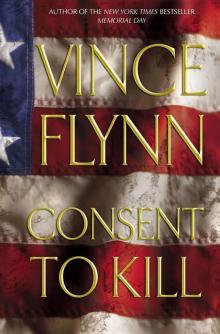 Consent to Kill
Consent to Kill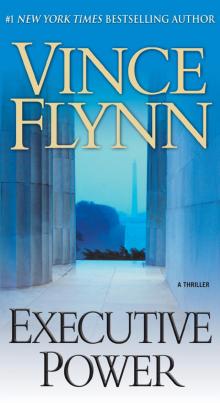 Executive Power
Executive Power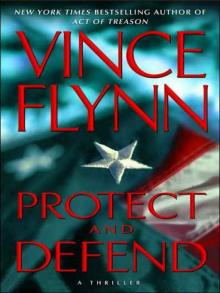 Protect and Defend
Protect and Defend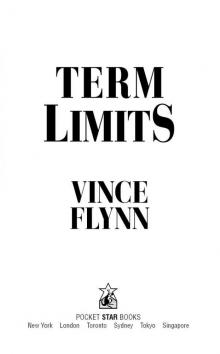 Term Limits
Term Limits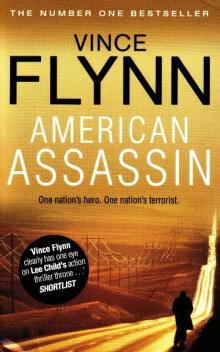 American Assassin
American Assassin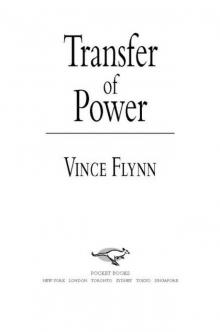 Transfer of Power
Transfer of Power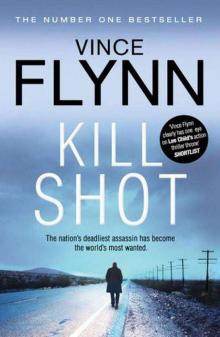 Kill Shot
Kill Shot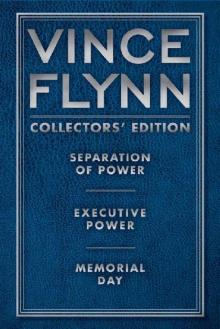 Vince Flynn Collectors' Edition 2
Vince Flynn Collectors' Edition 2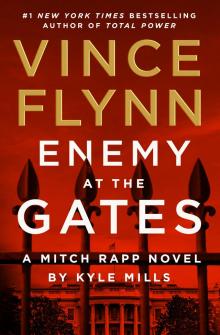 Enemy at the Gates
Enemy at the Gates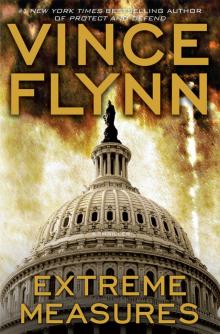 Extreme Measures
Extreme Measures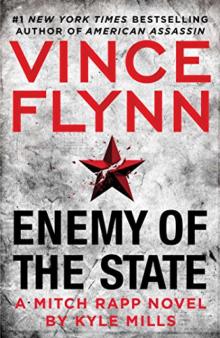 Enemy of the State
Enemy of the State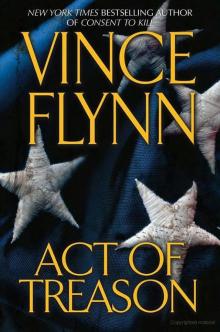 Act of Treason
Act of Treason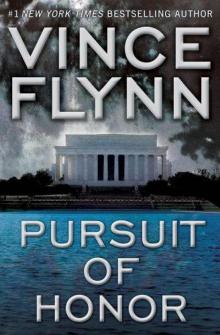 Pursuit of Honor
Pursuit of Honor The Survivor
The Survivor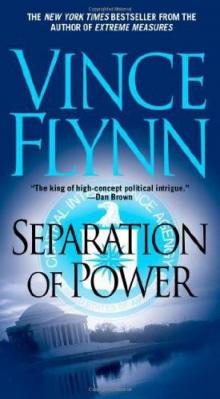 Separation of Power
Separation of Power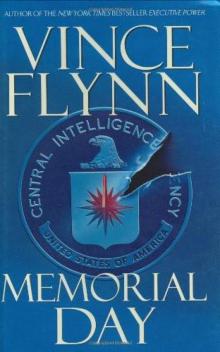 Memorial Day
Memorial Day The Last Man
The Last Man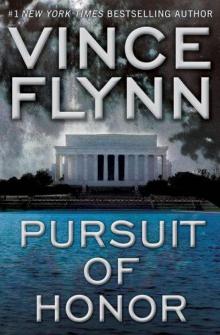 Pursuit of Honor_A Thriller
Pursuit of Honor_A Thriller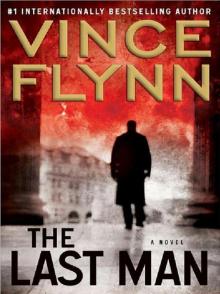 Mitch Rapp 13 - The Last Man
Mitch Rapp 13 - The Last Man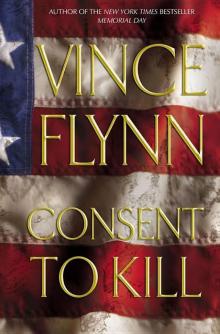 Consent to Kill:
Consent to Kill: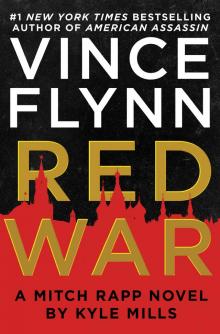 Red War
Red War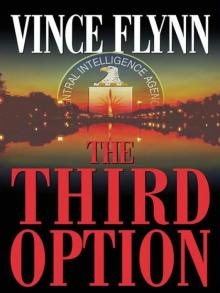 Mitch Rapp 02 - The Third Option
Mitch Rapp 02 - The Third Option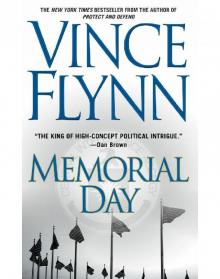 Mitch Rapp 05 - Memorial Day
Mitch Rapp 05 - Memorial Day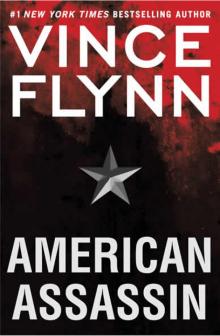 Mitch Rapp 11 - American Assassin
Mitch Rapp 11 - American Assassin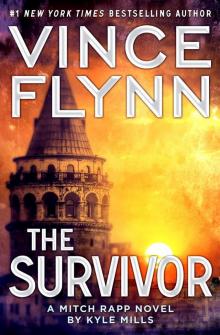 Mitch Rapp 14 - The Survivor
Mitch Rapp 14 - The Survivor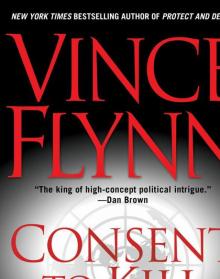 Mitch Rapp 06 - Consent to Kill
Mitch Rapp 06 - Consent to Kill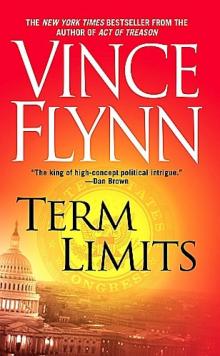 Term Limits mr-1
Term Limits mr-1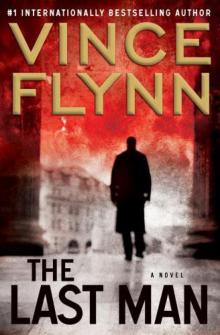 The Last Man mr-13
The Last Man mr-13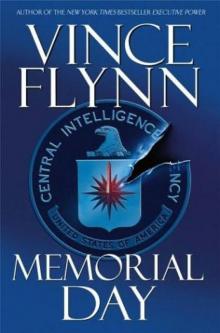 Memorial Day mr-5
Memorial Day mr-5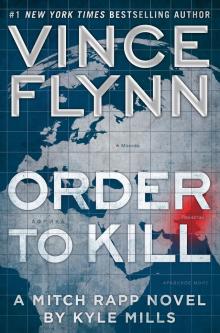 Order to Kill
Order to Kill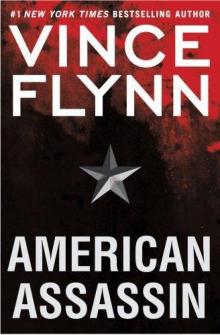 American Assassin: A Thriller
American Assassin: A Thriller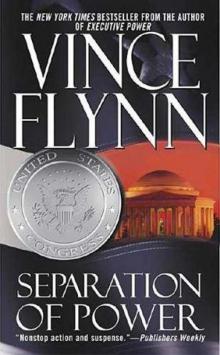 Separation of Power mr-3
Separation of Power mr-3